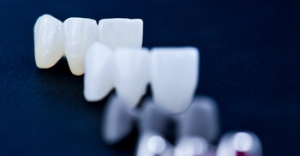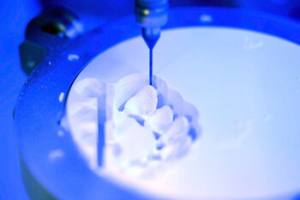Introduction
Dental veneers have carved a niche in cosmetic dentistry, promising a smile makeover that many desire. Made predominantly from porcelain or composite resin materials, veneers are thin layers meticulously designed to cover the front surface of teeth, offering an impeccable appearance. But amidst their rising popularity, one question remains pivotal: “Are veneers permanent?” Before venturing into this transformative dental procedure, it’s imperative to gauge the longevity and benefits veneers bring to one’s natural teeth.
What Are Dental Veneers?
In cosmetic dentistry, dental veneers stand out as a sought-after solution for enhancing one’s smile. Essentially, they are thin facades made from either composite or porcelain, adhered to the front surface of natural teeth. While porcelain veneers boast a translucent quality, closely mimicking the appearance of natural tooth enamel, composite veneers are known for their reparative capabilities and shorter procedure time. Choosing veneers offers myriad benefits, from concealing imperfections like stains and chips to reshaping teeth for a more symmetrical appearance. Their versatility and transformative potential make them a favourite in smile makeovers.
The Lifespan of Veneers
Embarking on the journey of cosmetic dentistry, especially when considering dental veneers, naturally leads to inquiries about their lifespan. After all, investing in veneers is not just for an improved appearance but also for durability. Thus, understanding the average longevity of porcelain veneers versus composite veneers is imperative.
Porcelain veneers, often favoured for their ability to mimic the luminosity of natural teeth, come with an impressive track record. They typically serve their aesthetic purpose effectively for about 10 to 15 years, with some even boasting a life of 20 years with meticulous care. Their ability to resist staining and maintain lustre makes them a premium choice in smile makeovers.
Conversely, composite veneers offer a more budget-friendly and often quicker solution. Constructed from composite resin, these veneers have a general lifespan of 5 to 7 years. However, it’s worth noting that technological advancements in dentistry have been pushing this boundary, offering composite veneers that last longer than their predecessors.

But veneers, as durable as they may be, aren’t invincible. Traumatic incidents, such as sports injuries, can compromise their structure. Similarly, chronic teeth grinding can exert undue pressure on veneers, leading to potential damage. And indulging in biting hard foods can risk chipping or even breaking them.
To wrap up, while the allure of veneers lies significantly in their cosmetic appeal, being informed about their lifespan and the elements influencing them remains crucial for a worthwhile investment.
Are Veneers Truly Permanent?
When diving into the transformative world of cosmetic dentistry, many wonder about the permanence of dental veneers. How long can one expect these aesthetic enhancements to last? The answer requires a blend of technical understanding and a patient’s perspective.
Technically speaking, veneers fall under the category of being semi-permanent. This designation implies that once a dentist affixes the veneer onto a tooth, it is there to stay for a long haul but not indefinitely. Whether it’s the more robust porcelain veneer or its composite counterpart, time and use will gradually wear them down. No material, no matter how advanced, is immune to the relentless march of time and the everyday stresses placed upon it.
Delving deeper into why veneers aren’t permanent reveals a confluence of factors. Their longevity is not just tied to the material’s innate properties but also to external influences. From the accidental chip from a hard food item to the gradual pressures of bruxism (teeth grinding), veneers face many challenges. Furthermore, the underlying natural tooth and surrounding gum tissues undergo changes, which can influence the veneer’s fit and appearance.
However, in many ways, the notion of “permanence” is in the eye of the beholder. For someone who diligently maintains oral hygiene, frequently consults their dentist, and avoids behaviours detrimental to veneers, these additions seem enduring, almost permanent. Conversely, a lackadaisical approach to care might shorten their lifespan considerably.
Caring for Your Veneers
The decision to opt for dental veneers marks the beginning of a journey towards a more radiant smile. However, as with all good things, their beauty and longevity are directly proportional to the care they receive. So, what are the best practices to keep your veneers in top condition?
Oral hygiene stands as the cornerstone of veneer care. While veneers may be immune to decay, the underlying tooth and gums aren’t. Regular and meticulous brushing and flossing ensure that the boundaries of the veneers remain free from potential plaque build-up, which could compromise their appearance and health.
Certain lifestyle choices can make a difference in extending your veneers’ life. Hard foods are often a culprit in veneer damage. Crunching on ice or hard candies can risk cracks or even dislodging—similarly, the choice of toothpaste matters. Non-abrasive varieties are ideal, as some pastes with harsh granules can wear down the sheen of the veneers over consistent use.
The importance of regular dental check-ups can’t be overstated. These visits serve a dual purpose: they are preventive and corrective. Routine check-ups can spot potential problems before they escalate, and they also offer an avenue for professional cleaning, ensuring veneers and natural teeth remain pristine.
The role of the dentist extends beyond just placing the veneer. They are your go-to experts for guidance on care, products best suited for veneer maintenance, and addressing any concerns or issues with your veneers.
To conclude, dental veneers can be a game-changer in aesthetic dentistry. However, their endurance and beauty are intrinsically tied to the care regimen they receive and the ongoing guidance from a trusted dentist.
Replacing and Repairing Veneers
Dental veneers, a beacon of cosmetic dentistry, serve as functional and aesthetic saviours for many. However, like all dental procedures, they’re not exempt from the test of time and circumstances. Over the years, one might face the decision of repair or outright replacement.

Recognising the need for intervention is crucial. If there’s visible damage, discomfort, or any detachment of the veneer, it’s a clear call for professional assessment and potential repair or replacement.
What does replacement entail? The damaged veneer is gently removed, the tooth is prepped—often involving a minor enamel reshaping—and a new veneer is bonded. Cosmetic dentistry advancements ensure this process is as seamless as possible.
Now, let’s talk about finances. Maintaining veneers over the years is an investment. While the upfront costs might seem substantial, long-term care, occasional repairs, and potential replacements need budgeting. Prioritising quality when choosing veneers and maintaining rigorous oral hygiene can be cost-saving in the long run, as they can reduce the frequency of repairs.
In essence, veneers, though a long-lasting solution to dental imperfections, will require upkeep. Embracing this aspect and planning for it ensures that the brilliance of a veneered smile remains undiminished over the years.
Conclusion
In cosmetic dentistry, dental veneers stand as a testament to the blend of art and science. However, understanding their semi-permanent nature is crucial for setting realistic expectations. They are resilient, yes, but not forever-lasting.
Ensuring your veneers last as long as possible is a shared responsibility. Your commitment to oral care and regular dental oversight creates the ideal environment for veneer longevity. But remember, generic advice can only go so far. Your teeth, your smile, and your veneers are uniquely yours, and they deserve personalised attention.
Always turn to a professional if you have questions or concerns or need expert guidance. Finesse Dental welcomes you to contact our clinic if you seek a blend of experience and innovation. Entrust your smile to experts who understand its value and intricacies.
References
Smile makeover with direct composite veneers https://www.ncbi.nlm.nih.gov/pmc/articles/PMC6076883/
Porcelain for veneers https://pubmed.ncbi.nlm.nih.gov/9893514/

